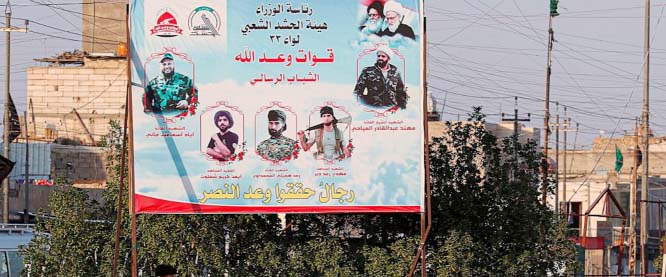
AP, Baghdad :
As the United States and Israel escalate their push to contain Iranian influence in the Middle East, countries in Tehran’s orbit are feeling the heat.
Pro-Iranian militias across Lebanon, Syria and Iraq are being targeted, both with economic sanctions and precision airstrikes hitting their bases and infrastructure. This is putting the governments that host them in the crosshairs of an escalating confrontation and raising the prospect of open conflict.
Nowhere is that being felt more than in Iraq. It is wedged between Saudi Arabia to the south and Iran to the east and hosts thousands of U.S. troops on its soil. At the same time, powerful Shiite paramilitary forces linked to Iran pose a growing challenge to the authority of the central government.
As the pressure mounts, divisions within Iraq’s pro-Iranian factions have burst into the open, threatening to collapse a fragile government coalition and end a rare reprieve from the violence that has plagued the country for years.
“Regional challenges facing Iraq will make it even more difficult for Adel Abdel-Mahdi to bring the (militias) under control,” said Randa Slim, a senior fellow at the Washington-based Middle East Institute, referring to Iraq’s prime minister.
The divisions among Iran’s Shiite allies in Iraq have been spurred by a spate of airstrikes blamed on Israel that have hit weapons depots and bases belonging to the Iran-backed militias, known collectively as the Popular Mobilization Forces, or PMF.
There have been at least nine strikes since July both inside Iraq and across the border in Syria, sparking outrage among PMF leaders. They blame Israel and by extension its U.S. ally, which maintains more than 5,000 troops in Iraq.
Israel has not confirmed its involvement in the attacks, and U.S. officials have said Israel was behind at least one strike inside Iraq.
The attacks have fueled calls for a U.S. troop withdrawal by hard-line anti-American groups in the country that have strong ties to Iran.
“The Americans are hostage here … If war breaks out, they will all be hostages of the resistance factions,” said Abu Alaa al-Walae, secretary general of the Sayyed al-Shuhada Brigades, one of the prominent militia factions with strong ties to Iran. He spoke in a televised interview this week.
As the United States and Israel escalate their push to contain Iranian influence in the Middle East, countries in Tehran’s orbit are feeling the heat.
Pro-Iranian militias across Lebanon, Syria and Iraq are being targeted, both with economic sanctions and precision airstrikes hitting their bases and infrastructure. This is putting the governments that host them in the crosshairs of an escalating confrontation and raising the prospect of open conflict.
Nowhere is that being felt more than in Iraq. It is wedged between Saudi Arabia to the south and Iran to the east and hosts thousands of U.S. troops on its soil. At the same time, powerful Shiite paramilitary forces linked to Iran pose a growing challenge to the authority of the central government.
As the pressure mounts, divisions within Iraq’s pro-Iranian factions have burst into the open, threatening to collapse a fragile government coalition and end a rare reprieve from the violence that has plagued the country for years.
“Regional challenges facing Iraq will make it even more difficult for Adel Abdel-Mahdi to bring the (militias) under control,” said Randa Slim, a senior fellow at the Washington-based Middle East Institute, referring to Iraq’s prime minister.
The divisions among Iran’s Shiite allies in Iraq have been spurred by a spate of airstrikes blamed on Israel that have hit weapons depots and bases belonging to the Iran-backed militias, known collectively as the Popular Mobilization Forces, or PMF.
There have been at least nine strikes since July both inside Iraq and across the border in Syria, sparking outrage among PMF leaders. They blame Israel and by extension its U.S. ally, which maintains more than 5,000 troops in Iraq.
Israel has not confirmed its involvement in the attacks, and U.S. officials have said Israel was behind at least one strike inside Iraq.
The attacks have fueled calls for a U.S. troop withdrawal by hard-line anti-American groups in the country that have strong ties to Iran.
“The Americans are hostage here … If war breaks out, they will all be hostages of the resistance factions,” said Abu Alaa al-Walae, secretary general of the Sayyed al-Shuhada Brigades, one of the prominent militia factions with strong ties to Iran. He spoke in a televised interview this week.

